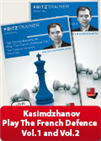The discovery of a new opening variation
By Carl Portman
People say that all of the chess openings have been seen before. Despite the unfathomable number of opening possibilities there are no new surprises, nothing more to discover. Well, I think I might just have blown that theory out of the water. Let me caveat this by saying that I don’t know for sure and, of course, I am open to a challenge or shown evidence that I am wrong, but please indulge me.
Yes, I believe that I have discovered a new opening.
 In this two-volume video course former world-champion and startrainer Rustam Kasimdzhanov shows you the ins and outs of this hugely complex opening.
In this two-volume video course former world-champion and startrainer Rustam Kasimdzhanov shows you the ins and outs of this hugely complex opening.Before I enlighten you, let me provide a little background information. I recently played in the UK Armed Forces Chess Championships, at RAF Wittering, and actually I emerged as the Veteran Champion for 2024, which was an added bonus, but that’s another story.
During one mealtime, I began chatting with David Barnes, a fellow player and someone who lives on the Wirral, which is a place in the north-west of England. I said that I was aware that there were red squirrels still existing in his part of the world and that I would like one day to photograph them. We then joked about the words rhyming, and I suggested that it might be fun one day to invent a new opening called the ‘Wirral-Squirrel Variation, or WSV for short’. We laughed it off, and then we forgot all about it.
By chance, we were paired against each other in the final round. We never spoke to one another beforehand, made no agreements about results (we both wanted to win) and there was absolutely no suggestion of playing for a weird opening, but my word that’s what happened.
As the round began with David as White, he pushed the e-pawn two squares with 1.e4 and I played 1...e6 ready for a good battle in the French Defence. His next move was 2.c4 which is not played very often, but I have played against it many times, and I instantly played 2…d5. David played 3.cxd5 and I replied with 3…exd5 so it is all good so far. Then he essayed 4.Qb3!?
This move took me by complete surprise. Although this move is known (the Steiner Variation) I confess that I had never seen it in my life and I was totally wrong-footed. I had no idea what to play. The correct move is simply to take the pawn on e4, but I did not want to allow him to play Bc4 with a threat against f7. I was thinking on my feet (or actually my backside) and literally couldn’t decide what to do.
Then, a move struck me. In fact, I set the position after 4.Qb3 up for an IM friend of mine and he could not guess my move, despite several attempts. At the board I suspected that David was in his comfort zone, and therefore I elected to throw a hand-grenade into his position to see what he would do. I reached out and played the move 4…a5!?
Yes indeed folks. This was the birth of the Wirral-Squirrel Variation. It rocked David so much that he sank into deep thought and after 5.Nc3 Nf6 6.e5 he offered a ‘grandmaster draw’ which I took. Don’t judge me. One reason was that I had no idea what was happening, but I also wanted to get home to my wife who was ill. I hope I am forgiven for that.
We did however briefly visit the analysis room to see what on earth was going on and we both agreed that neither of us had a clue. That’s amateur chess for you. Forget that it was only six moves and look again at what was played.
1.e4 e6 2.c4 d5 3.cd ed 4.Qb3 a5
Back at home I put the moves into the Chess.com database and no moves were found.
I then input the same moves into my ChessBase database of over ten million games and again, none were found. Not only that, the engine does not even offer 4…a5 as an option as you can see from the move choices below.

You might be wondering then what happens after 4…a5 and what the engine (Stockfish 16) thinks of it. Of course, the move looks ludicrous, even laughable and infantile. Yet take a look at this. I let the engine run for a good ten minutes and the evaluation was as follows.
 The ChessBase Mega Database 2024 is the premiere chess database with over 10.4 million games
from 1475 to 2023 in high quality.
The ChessBase Mega Database 2024 is the premiere chess database with over 10.4 million games
from 1475 to 2023 in high quality.
The position is still roughly equal, thus 4…a5 cannot be called ‘bad’ in that sense. It is quite true that the strongest move to play is 4…dxe4, after which the engine gives Black an advantage of +1, but isn’t it good to always have a plan B? One should have a surprise move available, and even the top masters can ‘uncork a novelty’ now and again. Why not this one? I encourage people to play it if they get the chance and see where it takes them. The game is meant to be fun after all.
So what do we make of all of this?
Well, to the best of my knowledge the move is completely new. It is very odd-looking but not at all ‘bad’ in the sense that it does not seriously compromise the Black position. Indeed, it makes White think about what happens if the pawn gets pushed to a4.
 So it was my 4…a5 move that made this a new opening. I am claiming it as the Wirral-Squirrel Variation, born on Monday 8th April 2024 with a nod to David Barnes who was the other protagonist in this development. It is true that he played a known opening after 4.Qb3, but without him doing that we would never have founded the WSV, so there it is. Am I saying that it is a major contribution to opening theory? No. Would I play it again in this position? Absolutely I would. I am very happy to have found this move over the board.
So it was my 4…a5 move that made this a new opening. I am claiming it as the Wirral-Squirrel Variation, born on Monday 8th April 2024 with a nod to David Barnes who was the other protagonist in this development. It is true that he played a known opening after 4.Qb3, but without him doing that we would never have founded the WSV, so there it is. Am I saying that it is a major contribution to opening theory? No. Would I play it again in this position? Absolutely I would. I am very happy to have found this move over the board.
We can now add the mighty squirrel to the Orang Utan, Elephant Gambit, Hedgehog, Hippopotamus, Monkey’s Bum and more.
You read it here first folks and I hereby claim to be the official founder of the variation. Maybe ChessBase will add it to their opening theory databases? It is playable after all.
I leave you with a photograph of myself and Dave in the analysis room still laughing about our short game and the fact that chess can still give us all so much pleasure.
Links
























